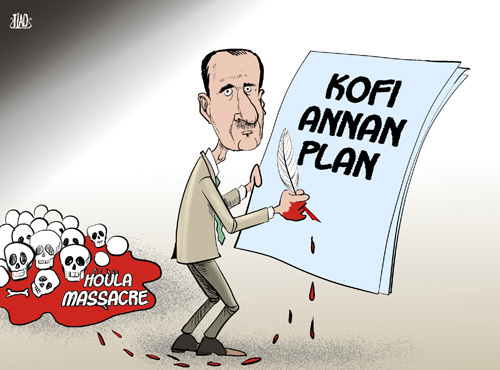Critical time for Syria
 0 Comment(s)
0 Comment(s) Print
Print E-mail China Daily, June 1, 2012
E-mail China Daily, June 1, 2012
The horrific massacres in Houla and Assukar are intolerable crimes against humanity, and bloody illustrations of how challenging it will be to secure lasting peace in Syria.
|
|
|
A butcher at the negotiating table [By Jiao Haiyang/China.org.cn] |
Those who masterminded and executed the atrocities must be held accountable. But it is too hasty to dump all the blame on the Syrian government before any investigation finds out the truth behind these crimes.
Rhetoric about "regime change" and military intervention is becoming louder than ever. The latest statement from the White House said that the leaders of the United States, Germany, France and Italy agree "on the importance of ending the violence of the government against its own people and the urgency of achieving a political solution".
It may sound less than credible to those preoccupied with overthrowing the government. But Syrian government's account, which involves arms trafficking into the country and outside support for armed terrorists, should also be taken into account.
The top priorities are finding and holding accountable the perpetrators of these massacres and determining the true picture of what is happening in the country.
The international community should bear in mind the lessons from Iraq, where a groundless allegation about weapons of mass destruction "justified" an otherwise criminal war and sowed lasting instability.
A fair and lasting political solution must be based on informed judgments, which in turn calls for an unbiased evaluation of the true state of affairs.
To prevent a greater humanitarian crisis in Syria, especially the worst-case scenario of an all-round civil war, atrocities against civilians must end.
And the prerequisite for this is making sure all parties involved commit to the peace plan brokered by UN-Arab League envoy Kofi Annan.
That it has yet to stem the bloodshed, or bring the Syrian government and opposition to the negotiating table does not mean it is a poor plan. Thus far, it remains the best possible solution to resolving the crisis.
Since all members of the Security Council see an all-out civil war as disastrous, they should work together and do everything possible to prevent it from happening.
There must be a greater UN presence in Syria and more pressure on the government and opposition to sit down and negotiate.






